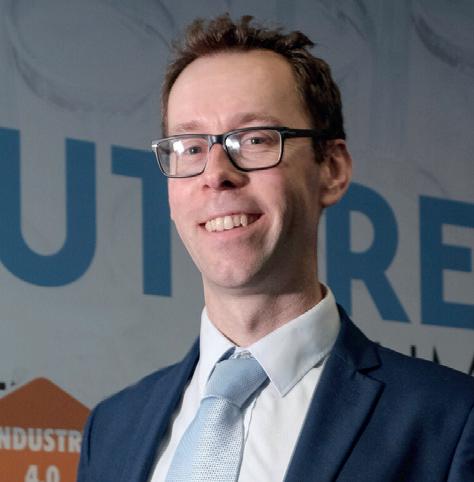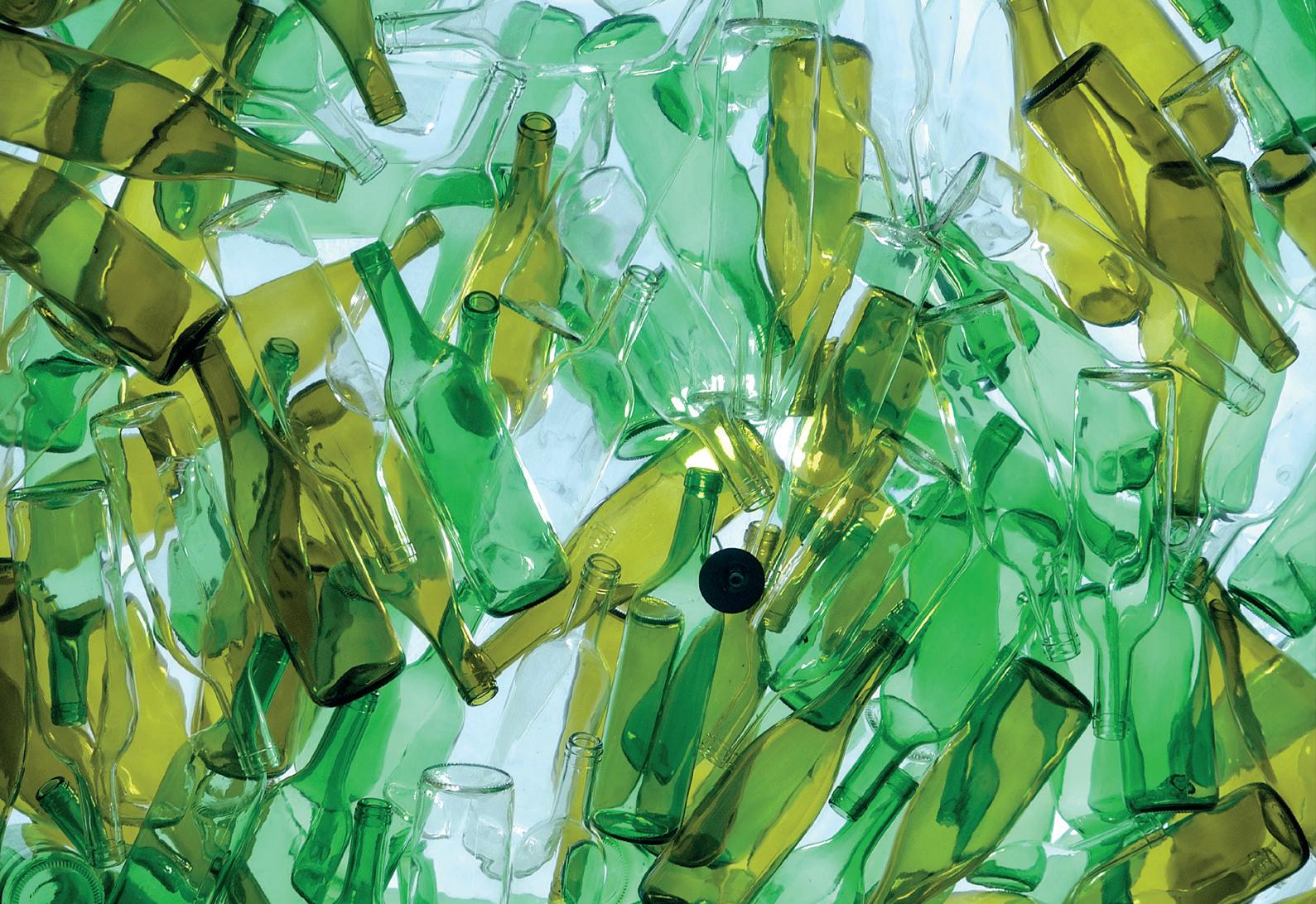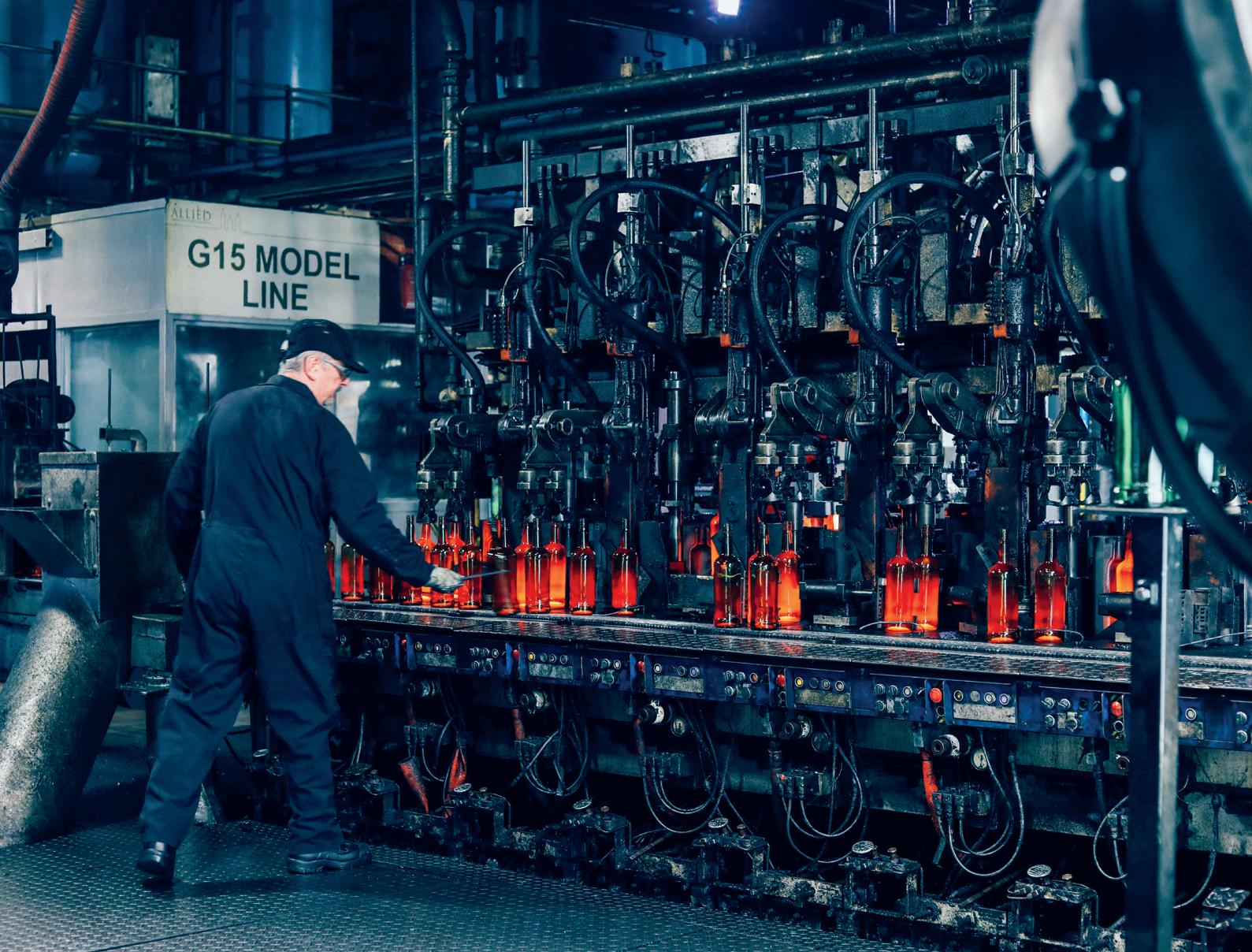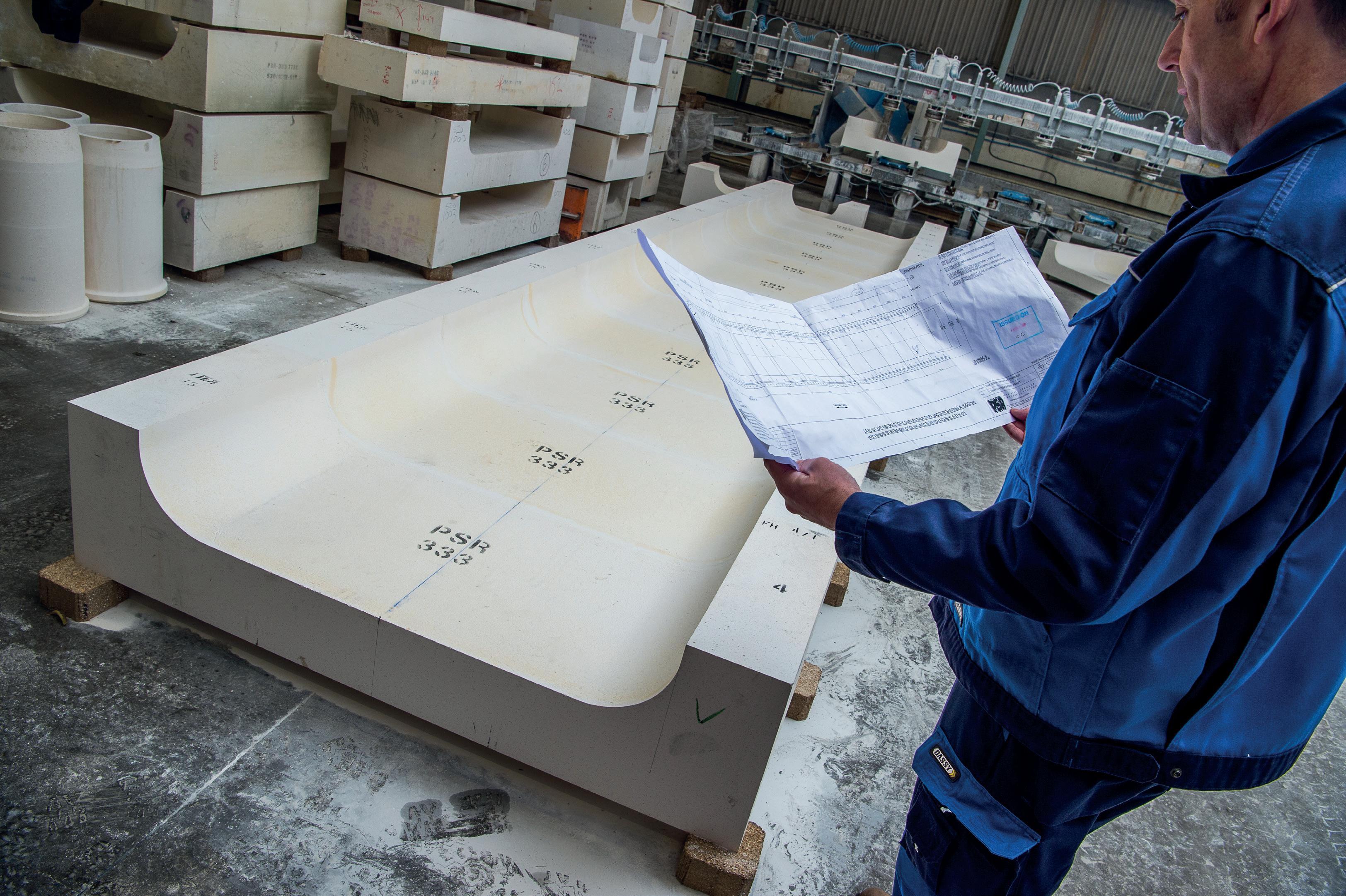
17 minute read
Editor’s Comment International news
GREG MORRIS, EDITOR

Collaboration remains key for climate aims
Congratulations to the Society of Glass Technology (SGT) for their hugely successful Furnace Solutions event earlier this month.
The annual meeting was held in person for the first time in three years and for many people it was a chance to catch up with old friends.
The success of the meeting is reflected in our five-page write up later in this issue.
It was also the first time the event had been held in St Helens, UK, right next door to the Glass Futures building.
The facility, still in construction, is something to behold. It is huge, about the same height as the adjacent St Helens rugby stadium and catches the eye. It will be the home of glass development not only for the UK glass industry but internationally as well.
Delegates at Furnace Solutions spoke about the importance of collaboration, particularly after such a long absence of face to face meetings. Glass Futures is the epitome of this.
It is a partnership of a number of companies from the UK, Europe, the USA and Asia. The talking point in the industry is decarbonisation and the use of renewable glass manufacturing before 2050 but ideally sooner.
It is a huge challenge and one unlikely to be achieved by companies working in their own silos. Only by working together, and alongside neutral, disruptive organisations such as Glass Futures, is the industry likely to achieve its aims. FRONT COVER IMAGE: www.eme.de
Be first with the news! For breaking, up-to-date news
VISIT:
www.glass-international.com
for daily news updates.
Glass safest packaging for food new research says
International research found that glass and ceramic packaging was the safest for food contact materials.
Nearly 3000 chemicals can potentially leak from packaging into food, making human exposure to these chemicals highly probable.
The study stated that of the 2881 Food Contact Chemicals (FCCs) detected, only 47 were detected in glass & ceramic food contact materials (FCMs).
Meanwhile, more than two thirds (1975) were identified in plastic FCMs, followed by paper & board (887).
“The study shows that glass is safest among the packaging materials as it has virtually no detected chemicals and therefore is the safest for human health,” said Adeline Farrelly, Secretary General of FEVE the EU federation of container glass producers.
The majority of the FFCs (65%) found were unknown; they had not been recorded in any regulatory or industry list to date.
Knauf Insulation has been named the Official Glass Recycling Partner of the Big Machine Music City Grand Prix in Nashville, US.
The fiberglass manufacturer will form a major glass recycling initiative for the threeday festival of racing and music, as well as Nashville’s entertainment districts.
The initiative will begin on July 1 at participating establishments in Broadway and in Midtown, culminating August 5-7 with the Big Machine Music City Grand Prix at the Nissan Stadium campus.
The company aims to collect 150,000 glass bottles throughout the month.

Glass supply issues in Mexico
Industries such as beverages, pharmaceutical and perfumery have faced a shortage of glass bottles due to a global increase in demand.
Glass production in Mexico is not enough cover the demand for manufacturers of beverages, food, perfumes and drugs. These industries are facing shortages and increasing prices for bottles and containers.
In the first quarter of 2022, production rose 7% while the demand for bottles grew 11% on average.
Mexican glass producers manufactured 5,317.3 million containers, an increase of 7.1% per year, after two years of contraction due to the pandemic, according to INEGI data.
In the same period, the production of tequila grew 30.8% annually in volume. Sauces, mayonnaise and jams increased by 11.1%, while vials grew by 8.9% and beer expanded by 5.5%. This generated an average increase of 11% in the demand for containers.
Tequila producers gave the following reasons for the increase in demand, which they labelled as a “global” problem: � The over-demand after Covid. � Gas supply problems in Europe.
� Raw material expenses, which tripled the cost in logistics. � Supply chain issues. � Mexican manufactures having full schedules until 2023.
INEGI reports that the country’s 94 glass plants operate at an average capacity of 95%.
To increase their capacity Vitro and Vidrio Formas announced expansion of their plants towards 2023. Meanwhile, industries such as tequila, mezcal, breweries, sauces and perfumes have chosen to migrate to aluminium or plastic containers where possible.
CelSian in training deal with Float Glass Consortium
CelSian has acquired the intellectual property of all training material from the Float Glass Consortium (FGC).
The firm will provide an introductory course on float glass, 8-9 November 2022, based on training material from the acquisition.
CelSian will also offer further training specially adapted to the needs of the float glass industry.
FGC was formed in 2008 by David Woodward and David Hilton, both NSG Pilkington retirees that continued consulting for many years.
Johan Lotter, a CFD Engineer at CelSian with over 10 years of experience in float operations, and Mr Hilton will provide a two-day introductory training on Float Glass Melting and Forming in St Helens, UK.
Registrations for this new training are already open.
Mr Hilton, Managing Director of FGC, said: “We are delighted to know that FGC’s float glass knowledge, that was built over the past 15 years, will keep on being transmitted through the CelSian Academy.
“We are confident that they will perpetuate our know-how and keep empowering current, and future, float glass professionals to write the future of that industry”.
NEWS IN BRIEF
Produvisa and Revimac re-engineer line
Glass container producer Produvisa joined forces with machinery supplier Revimac to re-engineer line 7.0 at Produvisa’s plant in Aragua, Venezuela.
Parts of the old Owens Illinois (O-I) IS Machine were replaced with new reengineered parts.
Line 7.0 is now running at full production.
Berlin Packaging acquires French supplier
Berlin Packaging will acquire specialist glass packaging supplier Verrerie du Comtat.
Berlin Packaging believes the supplier will strengthen its position in the wine and olive oil markets in France.
EME breaks ground with Glass Futures
EME has been awarded the contract to install the batch plant for Glass Futures’ Global Centre of Excellence in St Helens, UK.
Following a competitive engineering tender, EME was awarded the contract in March 2022 to install a batch plant for the state-of-the-art research and development facility.
Due for completion next year, Glass Futures will be a global hub for R&D, innovation and training, with the target of eliminating carbon from mass production in the glass industry, among others.
NSG integration with SYP Automotive
NSG will integrate with a major Chinese automotive glass manufacturer.
NSG will transfer its automotive processing operations in Guilin and Tianjin to SYP Kangqiao Autoglass (SYP Automotive).
SYP Automotive is a manufacturer of advanced coated float and processed products for the Chinese architectural glass market. NSG believes the integration will strengthen its ability to meet the needs of vehicle manufacturers in China.

NEWS IN BRIEF
Encirc finds bulk shipping reduces CO2e
Encirc study finds bulk shipping could reduce the UK wine industry’s carbon footprint.
Encirc, in co-operation with environmental consultancy Carbon Intelligence, found products from the most popular wine-making regions could reduce their shipping carbon footprint by over 50% if they were transported to the UK in bulk, rather than in bottles.
Forglass installs Stoelzle cullet system
Forglass will construct a new PCR Cullet System at Stoelzle’s plant in Knottingley, UK.
Forglass will design and manufacture the company’s second PCR Cullet System at its Knottingley plant.
The new system is scheduled for commissioning later this month.
Glaston increases automotive production in China
Glaston plans to increase the production of automotive glass equipment for China at its Tianjin factory.
The aim is to serve customers in the largest global automotive market with local machine production.
The estimated investment is approximately €1.4 million.
The first China-produced products for the Chinese market are expected to be delivered in 2023.
CPS plan receives boost
Solar glass manufacturer Canadian Premium Sand (CPS) has completed the latest phase of its preparations to build a glass manufacturing facility.
The company has completed a Front End Engineering and Design (FEED) study, as well as a market report confirming the economic viability of manufacturing patterned solar glass at a site in Selkirk, Manitoba, Canada.
Allied Glass €45 million furnace investment
Allied Glass has invested €45 million in a 300t/day furnace at its Leeds, UK facility.
New Emhart machines, capable of both double and triple gob manufacture, will be complimented with new transport and stackers, energy efficient lehrs and gob weight control and inspection camera systems.
The cold end lines will be completely removed and replaced with new lines and palletisers from MSK with an inspection system from Tiama.
In April 2022, the L2 furnace was drained and demolished after 12 years of service to the facility, to make way for the new development.
Alan Henderson, CEO of Allied Glass, said: “This is a huge investment for us here at Allied. The whole of our Leeds No.2 shop is being replaced from furnace through to finished goods inspection and packing which will hugely improve our site’s abilities.
“We will also be continuing our developments with further £1 million of investment in our decoration facility for the second half of this year as our client portfolio continues to grow.”
The company is working on expanding the building that houses the production facility to accommodate the development.
Allied Glass said the development will revolutionise its ability to manage its carbon footprint, enabling it to deliver greater volumes of glass with lower emissions.
The new furnace will increase output to 300tpd, achieving a 20% energy efficiency gain and targeting Nox < 800mg/Nm3. F Allied Glass specialises in manufacturing containers for prestigious spirits brands.
UK Government funds sustainable glass projects
Glass Futures and KEW Projects have secured project funding from the UK Government.
The UK Government will fund £299,957 for Glass Future’s project on renewable biofuels and £299,310 for KEW’s project targeted at decarbonisation.
Glass Future’s renewable biofuel project will take place in Sheffield, UK.
The project will examine switching glass container furnaces from natural gas to waste-derived fuels and build upon findings from Glass Futures’ previous projects.
The team will produce detailed plans for industrial-scale trials of the most attractive waste-derived fuels identified at commercial glass and ceramics plants.
KEW’s decarbonisation project will be located in Tamworth, UK.
The project will explore switching flat glass and glass fibre production facilities from natural gas to converted gas waste and biomass.
The consortium will demonstrate that KEW’s modular gasification technology can successfully convert waste and biomass into a hydrogen rich syngas. This will substitute the combustion of carbon-intensive natural gas at two glass production facilities.
INDUSTRY LEADING REFRACTORY SOLUTIONS
Long-life refractories with proven track records.



NEWS IN BRIEF
Bangkok Glass improves emissions at Thai plant
Bangkok Container Glass’s emissions at its Pathum Thani plant were 10% below the average of the glass manufacturing industry in Thailand.
In the fi scal year 2021, BGC’s plant released total of 141,859 tons of CO2e (or 0.692 tons of CO2e per ton output).
Thus, the plant was certifi ed as a ‘Carbon Footprint Organisation’ (CFO) by the Thailand Greenhouse Gas Management Organisation.
Schott invests R$ 10.5 million in Brazilian plant
Schott will invest in an expansion at its Indaiatuba plant in São Paulo, Brazil.
The company acquired a new fl at oven and automated the drill line with the aim of increasing its glass tempering capacity by 45% and the unit’s cutting capacity by 35%.
With the investment, Schott’s total capacity in Brazil will grow by 55% and is expected to have a 40% increase in sales throughout South America later this year.
NSG launches solar array at Ohio facility
NSG Group has launched a 1.4 MW photovoltaic solar array at its Rossford, Ohio, USA glass manufacturing facility.
The fl at glass manufacturer said the solar fi eld is fully operational and will supply about 2.5 million kWh of renewable energy annually.
The array will provide energy to the facility for the next 20 years under a power purchase agreement.
Ardagh’s Brazilian glass packaging facility
Ardagh Group has said its fi rst glass production facility in Brazil will be in Juiz de Fora, Minas Gerais.
The facility will supply glass packaging to customers in the growing Brazilian market with production expected to commence in the fi rst half of 2024. Once operational, the facility will provide 300 jobs.
Top 10 stories in the news
Our most popular news over the past month, as determined by our website traffi c. All full stories can be found on our website.
� 1. Glass supply issues in Mexico � 2. Glass safest packaging for food � 3. German beer glass bottle shortage � 4. Indian company changes name � 5. Sisecam plots Eskisehir glass packaging investment � 6. O-I Glass completes Canadian plant sale � 7. glasstec exhibitors list released � 8. Webinar focused on Lubrication in Glass Making � 9. Ardagh’s Brazilian glass packaging facility � 10. NSG launches solar array at Ohio facility
For the latest Industry News scan the QR CODE using your iOS or Android device
Encirc’s Lara Edison wins Furnace Solutions best paper award
Lara Edison of glass packager Encirc won the Michael Garvey award this year’s Furnace Solutions 2022 conference.
Ms Edison, a Batch and Furnace Supervisor, provided a presentation which discussed a successful three-week biofuels trial at the glass manufacturer and fi ller’s Derrylin, Northern Ireland site.
Gas was switched with biofuels made from animal fat in a project organised in conjunction with UK research and development group Glass Futures.
The trial helped reduce the CO2 emission of each glass container by 89% compared to the average container produced at the Derrylin plant in 2020.
The Furnace Solutions conference was organised by the UK Society of Glass Technology (SGT) and took place on June 8-9 2022.
The Michael Garvey Award is presented each year to the winner of the best paper and is sponsored by Guardian Industries.
SGT president Stuart Hakes said Ms Edison’s paper just edged the other 14 presentations; each paper had an overall theme of decarbonisation in the glass industry.
Record results at AGI Greenpac
Indian packager AGI Greenpac reported record results in its latest fi nancial note, driven by sales of glass containers.
For FY22, the Packaging Business revenue from Operations increased from 1259 crore to 1436 crore, registering a growth of 14% Y-o-Y. EBIT increased 21% Y-o-Y to 238 crore from 196 crore in FY21.
For Q4 FY22, the Packaging Business revenue from Operations and EBIT came at 438 crore and 76 crore respectively.
The sales growth was driven by a 10% increase in glass container packaging volumes, led by demand for glass from the beer and wine industries.
The company started trial production of its greenfi eld plant in Bhongir, Telangana manufacturing speciality glass for industries such as perfumery, cosmetics, high-end liquor and pharmaceuticals including vials.
Vice Chairman and Managing Director Sandip Somany, said: “Our packaging products business continues to deliver revenue growth, driven by increased demand for glass packaging from key end-user industries and the company has been able to maintain a strong EBITDA margin profi le despite the sharp jump in commodity & fuel prices and infl ation.”
NEWS IN BRIEF
Sisecam Eskisehir glass packaging investment
Sisecam is planning a €54 million furnace investment at its Eskisehir, Turkey, glass production facility.
The facility currently has four furnaces and production capacity will increase from 378,910 tonnes a year to 745,080.
A fifth production line is also scheduled as part of the investment. The new furnace is expected to be operational by early 2023.
Rene Meuleman moves on from CelSian
Glass industry veteran Rene Meuleman is to leave his role at CelSian glass.
Mr Meuleman will re-join Schneider Electric effective from June 1. His main task will be to support Schneider Electric’s green glass initiative.
Somobresle becomes Meca Glass Group
Four French glass companies have combined into one entity.
Mecavalente, Somobresle, Meca-Moules-Services and Les-Mouleries-de-la-Bresle have united within the MecaGlass Group (MG Group).
The company remains at the service of the glass industry; all customer contacts remain unchanged.
O-I Glass completes Canadian plant sale
A subsidiary of O-I Glass recently completed a sale and leaseback transaction for a plant located in Brampton, Ontario, Canada for CAD $244 million (US$ $191 million).
Andres Lopez, O-I Glass CEO, said: “This sale is another milestone in our portfolio optimisation programme and builds upon the Colombian tableware divestiture completed earlier this year.
“To date, we have successfully realised approximately $1.3 billion of proceeds toward our target of $1.5 billion, which we anticipate will be achieved in the second half of 2022.”
Pilkington Polish expansion
Pilkington IGP has increased the capacity of its plant in Ostroleka, Poland.
The insulating glass manufacturer has completed its expansion to double the plant’s production capacity.
Investment work started in 2020 and was divided into two stages. Between June and December 2020, a new production hall was built, and two cutting tables and one line to produce insulating glass were launched.
The second phase began in March 2022 and ended a month later. As part of this phase, a glass cutting table and a line to produce insulating glass units were launched.
The plant has gained approx. 10,000 m2 of production space as a result.
Works related to the expansion did not interfere with the normal operation of the plant. 80 new jobs have also been created, bringing the total number of factory employees to 165 once all vacancies are filled.
The expansion of the Polish factory is not the company’s last investment. It has further planned to expand its plants as well as develop new, specialised types of glasses.
Ametek Land monitoring system reduces refractory failures
Forglass at Glassman 2022
Ametek Land’s latest monitoring system helps to reduce failures and deterioration in glass furnace refractories.
The LWIR-640 system monitors the exterior of the melt tank and identifies any hot areas that may indicate refractory damage. It also gives an early warning of potential glass breakouts.
This long-wavelength thermal imager provides a full temperature measurement range of -20 to 1000 °C (-4 to 1832 °F) in three ranges with a choice of different optics and lenses. It combines high-resolution radiometric camera technology with sophisticated data processing and powerful software support, delivering detailed thermal images.
The thermal imaging provided by the LWIR-640 camera allows a continuous view of the entire target at any distance. Thermal data generated by the camera is presented in real-time, making it faster and easier to detect anomalous hot spots, alerting plant staff to take immediate action.
Philippe Kerbois, Global Industry Manager of Glass at Ametek Land, said: “Around 70% of container glass production costs come from energy, so preventing cracks and lost heat produces significant savings. Early detection of glass breakouts enhances plant safety, so using thermal imaging solutions from Ametek Land ensures fast detection of glass breakouts, allowing for early maintenance, increased safety, and longer lifespan of the tank.”
In addition to providing a fast-response safety monitoring system, the LWIR-640 solution also supplies the thermal data necessary to detect damage or wear to the refractory lining. This allows corrective maintenance to be scheduled at the least disruptive times.
Forglass joined industry leaders at Glassman Latin America in Monterrey, Mexico.
Forglass attended the recent Glassman Latin America trade show and highlighted the friendly atmosphere of the show in its review, stating that: “Monterrey in May was just as exciting as it sounds!”
The company was able to meet glass producers in the western hemisphere, talk about their most important issues and share innovations in technology aimed at reducing energy consumption and emissions connected with glass production.
Piotr Knast, Forglass CEO, said: “We felt the warmth not only in a meteorological sense, but most importantly from the hosts and participants of the trade fair.
“The easy-going atmosphere did not detract us from serious and productive business meetings, and it was exciting to see so much interest in the technological solutions that we have developed in Poland.”
Given the opportunity for fruitful business relationships in the region, Forglass plans to make Glassman Latin America a regular event on its calendar










